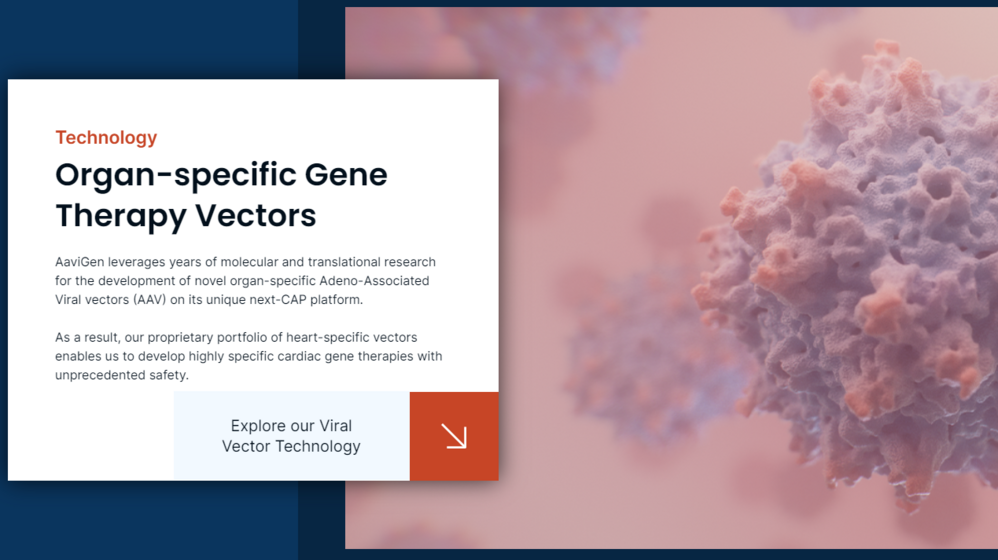DER MEDIZINER
„Der Technologiepark ist für unsere Zukunft ausgesprochen wichtig. Mit einer Finanzierung von gegenwärtig 22 Millionen Euro haben wir unsere „Inkubator-Phase“ im Universitätsklinikum verlassen und für die anstehende Wachstumsphase im Technologiepark neue Räumlichkeiten gefunden. Alle Akteure haben hier mit Erfahrung und Lernbereitschaft gut zusammengespielt. Im Technologieparkt haben wir ausreichend Platz, um unser Unternehmen weiterzuentwickeln und zu internationalisieren.“
Prof. Dr. med. Patrick Most
Leiter der Sektion Molekulare und Translationale Kardiologie
am Uniklinikum Heidelberg

About Prof. Dr. med. Patrick Most
Prof. Dr. med. Patrick Most is the Head of the Section of Molecular and Translational Cardiology in the Department of Cardiology at Heidelberg University Hospital. With his latest academic spin-off and biotechnology company, AaviGen, he is dedicated to developing gene therapies for cardiovascular (heart and blood vessel) and cardiopulmonary (heart and lung) diseases.
An interview with Prof. Dr. med. Patrick Most.
How did you become a professor?
After my DFG training scholarship, I accepted a tenure-track professorship offer at the Medical College of Thomas Jefferson University in Philadelphia in 2006. In 2010, I was appointed to a professorship in Molecular and Translational Cardiology in the Department of Cardiology at Heidelberg, which was then led by Prof. Hugo Katus. Since then, I have been working at the clinic with a focus on gene therapy for cardiomyopathies and their clinical translation.
What goals have you set for yourself?
For me, medical research is also a commitment to bring applicable results to patients – as improved diagnostics or improved therapies. I believe that society can expect this due to the extensive public funding. In gene therapy, we ourselves develop new therapies for cardiomyopathies from basic research.
How do you achieve this translation yourself?
Over several years, we have built the entire pathway from basic research to biotech spin-offs. This sounds logical in theory, but in practice, it's easier said than done. First, it is necessary to substantiate a new therapeutic or diagnostic principle to ideally achieve a proof-of-concept in clinical scale and applicability. Since we are talking about highly innovative developments with high therapeutic potential but also high risk of failure, risk-averse pharmaceutical companies will not jump on board immediately. Often, a spin-off is the only solution.
What are the other challenges?
For a start-up, you have to move out of the academic comfort zone into the business world, which has its own laws. As a founder, you must convince experienced investors not only of your project but also that you can lead a business with a competent team and manage investments with calculable risk.
As physicians, we are initially not trained for this. But you can acquire business, legal, and communication skills or bring in this expertise through a competent team. A start-up requires taking on new roles. Therefore, one should have great openness and willingness to learn. I have taken on the role of a company founder in recent years.
What importance do spin-offs have in Germany?
Spin-offs already have a high value here. In biopharmaceutical developments, it is often highly innovative small companies that bring new technologies and solutions for diseases to market. The last step to the patient often involves a strategic partnership with a global pharmaceutical company or an acquisition, as the operational requirements for accessing the healthcare market are enormous.
The potential that undoubtedly exists in Germany is not always fully exploited. As already mentioned, a founding endeavor is an iterative process with many steps. There is a lot of room for improvement and learning. We need an environment that understands failure as a "precursor to success" and does not shy away from setbacks.
What do you appreciate about the Heidelberg location?
Heidelberg has an incredible density of high-quality University, non-university, and clinical institutions. There is a wide range of collaboration opportunities in research and medicine, which can be a driving force and starting point for innovation through spin-offs. The understanding that more can be achieved together is also strong in Heidelberg. We have found exceptional support in many areas, especially from the rectorate. With Dietmar Hopp, we have an investor who recognized the potential of our new developments with his experience and foresight and helped us pave the way to the patient with venture capital. We need to scale this at the location.
How do you cooperate with the Heidelberg Technology Park?
The Technology Park is extremely important for our future. With current funding of 22 million euros, we have left our "incubator phase" at the University Hospital and found new premises in the Technology Park for the upcoming growth phase. All parties involved have collaborated well with experience and a willingness to learn. In the Technology Park, we have ample space to further develop and internationalize our company.
How do you assess the space situation in Heidelberg?
Spaces in Heidelberg – especially the newly created ones – are unfortunately often very expensive. At least that has been our experience. As a young start-up, we have to carefully consider how we use our funds. It would certainly be good if more spaces could be created in the Technology Park in close proximity to the clinic that could be used more flexibly for biotech start-ups. This would be another building block for a vibrant Heidelberg start-up scene.
Where do you see the future of Heidelberg?
My vision is a kind of Biotech Valley, where Heidelberg fully exploits its innovation strength in biomedical research through spin-offs and attracts even more investors. To achieve this, the local and national framework conditions need to be improved. The understanding among stakeholders is there. We need to make the necessary bold decisions. It is not just about the location but also about the well-being of our patients. As a physician, this is my central motivation; otherwise, I would not face the challenges of a start-up.
by Dr. Stefan Burkhardt